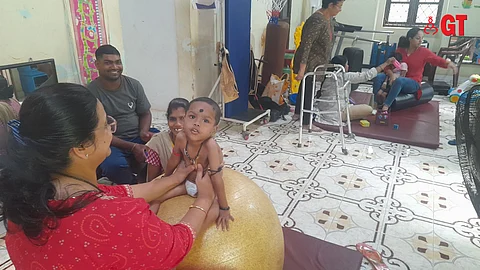

When four-year-old Sunil (name changed) smiles, the room radiates with emotions of joy and wonder as the little boy, born with a sickness that is incurable, binds his family and all those who visit him with love. And to help lessen his and his family’s pain is the team from Novi Survat, an NGO that has been instrumental in introducing palliative care for children in Goa.
Palliative care – a term that could be new to many – signifies offering dignity to patients when death is inevitable. “Death is inevitable but bad death is avoidable. Prolonging poor quality of life is a torture and palliative care is about providing support not just till death but even during bereavement,” said Dr Rajam Iyer, consultant pulmonologist, Mumbai during her interaction at the World Hospice and Palliative Care Day.
When cure is not possible, palliative care steps in to stretch what would be best for the patient until the last, and it includes not just the patient but the family too and that is what Dr Iyer meant by saying, “palliative care does not end when patient dies because it includes bereavement support.”
Sai is in his teens and along with his two siblings, lives alone with his single mother in a single room in Thivim. The team from Novi Survat, on receiving information that he is unwell, pay him a visit and as Sai sees them entering, nothing seems wrong with him – a signal of importance of human interaction during illness.
“Palliative care is about crossing different borders of society to be able to offer a decent living to those societies that do not feel welcomed. It is about being able to touch a sick person at the right place, at the right time, wherever they are,” says Dr Kurt Cordeiro, a member of the Novi Survat team that even travels to Chorla Ghat.
Palliative care is nascent in Goa and yet, within a short span, such care has reached patients in almost every corner of Goa. Whilst Novi Survat shoulders the onus of palliative care for children, adults have started feeling the warmth of this care through Palliative Care Project South Goa.
Simao (name changed) is in his seventies and with no medical cure possible, has begun to wait for his end with dignity. “I have been told, there is no cure but the visits I get from the palliative care team from South Goa, is giving me the courage to face death, hopefully with a smile,” he said as he applauded the steps medicine is taking in Goa.
Palliative Care Project South Goa is new, while Novi Survat started for children in 2015, and both want to embrace Goa not as individual entities but with the community as a whole.
“Palliative care is about awakening the human touch in society. Ours will be a success story when all, without being told, will know how to help the other. The richness of our community will be seen when we are able to reach all,” believes Dr Ira Almeida, Project Director, Palliative Care Project, South Goa and retired Director of Health Services.
“When I was working, I realised that little was being done for children with disabilities at GMC and hence my decision to start Novi Survat,” said Director, Dr Philomena D’Souza who retired as HOD of pediatrics, Goa Medical College (GMC).
When I was working, I realised that little was being done for children with disabilities at GMC and hence my decision to start Novi Survat
Dr Philomena D’Souza, Director Novi Survat
“If we can see the happiness in a child, it is more than enough,” she added as she interacted with the needy children and their parents during sessions.
“The best time to learn to swim is when the sea is calm,” said Dr Iyer from Mumbai and incidentally, the Goa community is benefitting from palliative care by two individuals who learnt swimming in pediatrics – Dr Philomena and Dr Ira – who are both supported by CIPLA Foundation.